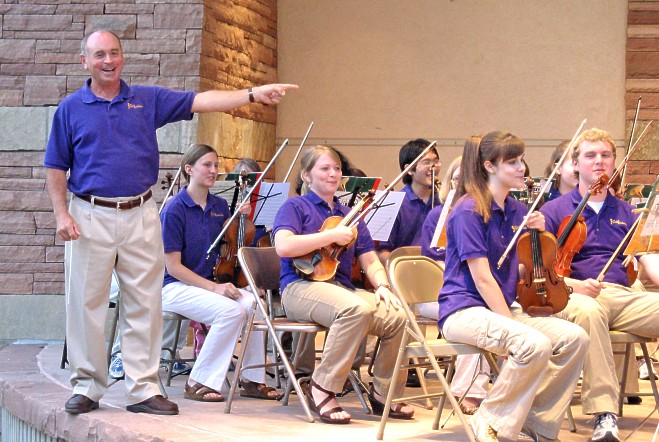
Kansas Snapshots by Gloria Freeland - Feb. 11, 2011
"Lift the notes off the page!"
What do a classically-trained cellist, a rock-band drummer and a bunch of choir teachers have in common? The obvious answer is music, albeit very different styles of music.
Another answer is that husband Art and I had the pleasure of being in the audience for all three within a period of six days a couple of weeks ago.
But that only served to help us see something else all three shared.
When Art insisted we go to the recital by David Littrell, Kansas State University's Distinguished Professor of Music, I balked. The campus had been closed the two previous days because of ice and blowing snow. Sidewalks were still slick and temperatures were bitterly cold. All I wanted to do was go home and hibernate.
Yet soon after Littrell began, I was glad Art had insisted.
If I were a music critic, I'd begin a column about Littrell's performance by noting that he started with Bach's "Sonata in G Major" on the viola da gamba, a mid-to-late-15th century instrument. I'd note he then moved to the cello, completing three more pieces before closing with my personal favorite, "Spinning Song," by David Popper. I'd almost certainly mention my amazement at how quickly his fingers moved up and down the fingerboard and the amount of energy the piece required.
Yet descriptions of Littrell's instruments and his technical skill don't really explain why I was so moved by the performance. Yes, excellence is part of it. Daughter Katie spent three years in Littrell's Gold Orchestra and often heard him say: "Good enough, isn't!"
But there is another common thread in all three situations - a thread I had come face-to-face with just four days earlier. Katie had attended Vocal Arts Day at K-State. About 200 university students and 275 high school students and their teachers from across the state had given up a Saturday to learn more about singing. It was an intense day of rehearsing, culminating in a concert the same evening. Art and I came early to videotape a session for Katie's vocal teacher.
The clinician was Craig Arnold, a professor of conducting at the Manhattan School of Music in New York and the conductor of the New York City Chorale and Chamber Orchestra. And as might be expected, much of what he said dealt with various musical subtleties that, when put together, have a big effect on the final performance.
But the part that caught my attention was when he paused briefly and spoke not about notes and words and composition; he paused to talk about passion. And it seemed that as he warmed to the subject, the quieter he became and the more carefully the students listened.
"This is not just an artifact," he said as he held the sheet music in his hands. "You need to lift the notes off the page. You have a gift. Use it. Give yourself up to the piece."
He smiled when he spoke about when he had taught at Luther College in Minnesota. He said it took the Norwegians longer to get bold.
"I would rather you put a bold forte where it doesn't belong than to use too much caution," he said. "You have the strength of 500, but the focus of one."
He also spoke about the importance of eye contact with the audience, the importance of the students showing in their faces that they did not just hear - but could really feel - the music.
This came through again in the voice master class that followed. Three students - a soprano, a bass and an alto - each sang one piece and then K-State voice professors Reginald Pittman and Patricia Thompson critiqued their performances and gave them advice. In the span of 10-15 minutes spent with each, I could hear definite improvements. Chloe, the soprano, seemed to gain confidence. Alex, the bass, became more expressive with his use of Italian. And our Katie, the alto, was able to project better. It was as if all three became more animated and more mindful of how their music can touch others. As Pittman said, "We don't want to sing to ourselves; we want to sing to those people out there."
Thinking back now to Littrell's recital and the many times we've watched him work with students, it's the passion he has for what he does that is the special ingredient he brings to the situation. It's an essential component of the chemistry that develops with those he teaches.
We also saw passion at play the evening before Vocal Arts Day when the band, Kansas, played with the K-State Orchestra. We had heard the band a few years ago when they performed with the Topeka Symphony Orchestra. In both performances, we were so impressed with how much of themselves they put into their music.
Later, Art ran across an interview with drummer and manager Phil Ehart in the November/December 2010 issue of Halftime Magazine.
"I would say that as long as you're having fun playing an instrument, play as long as you can. That's kind of why we all started, because it's fun. ... If you want to do it as a profession, always keep it fun because if it turns out that you can't make a living then, at least you had a good time. That's something that people just can't take away from you. Do it for the right reasons, play because it's a fun thing to do, you can never go wrong. I'm still having fun after 40 years of playing the drums. If it's not fun, don't do it anymore."
Art once told me about a talk his Dad had with him. His Dad spoke about how it was important to be able to put food on the table and keep a roof over your head. But he also told him that if he had options, he should choose the thing he loved to do.
We saw that in Ehart's and Littrell's performances. We saw it in the instruction from the Vocal Arts Day instructors. Julie Yu, co-director of choirs and choral education at K-State and one of the organizers of Vocal Arts Day told the students, "Keep singing. If you don't, it would be a crime against humanity."
Talent is important; so is skill. But something important is lacking without passion. It is passion that pushes Littrell through hours of practice. It is passion that keeps Ehart on the drums by night and arranging dates for the band by day. And it was passion when those 475 voices sang as one voice their final number - "How Can I Keep from Singing."

Craig Arnold directing the men's choir on Vocal Arts Day.

David Littrell with the Gold Orchestra during a concert in Colorado.